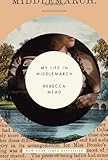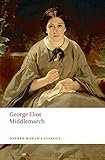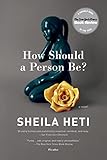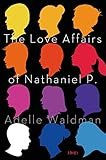 Over coffee in a cafe in Fort Greene, Rebecca Mead asks me what my favorite book is, and then she stops herself. “Having a favorite is a stupid thing,” she says. “It’s like asking a child his favorite color. Only children have favorites.” Of course this isn’t true. Committing to a favorite book is like committing to a relationship, which is to say that it carries no automatic promise of deepening your engagement with human life, and may impede it. (Very often, when someone tells you his favorite book, you think he should have read more books before settling down.) The danger of poorly chosen commitment is a major theme of Mead’s favorite book, George Eliot’s Middlemarch — young, energetic Dorothea is stymied by her marriage to the permanently blocked scholar Casaubon; the ambitious doctor Lydgate is destroyed by his marriage to the materialistic Rosamond — but My Life In Middlemarch, Mead’s new book about her favorite book, makes it clear that she has chosen well. Mixing memoir, criticism, and literary history, with a sharp eye for all three, My Life in Middlemarch makes us feel what it’s like to live with a book throughout one’s life. A veteran New Yorker writer, Mead describes how her sympathies have shifted among characters from one reading to the next, and about how her life and reading have changed each other.
Over coffee in a cafe in Fort Greene, Rebecca Mead asks me what my favorite book is, and then she stops herself. “Having a favorite is a stupid thing,” she says. “It’s like asking a child his favorite color. Only children have favorites.” Of course this isn’t true. Committing to a favorite book is like committing to a relationship, which is to say that it carries no automatic promise of deepening your engagement with human life, and may impede it. (Very often, when someone tells you his favorite book, you think he should have read more books before settling down.) The danger of poorly chosen commitment is a major theme of Mead’s favorite book, George Eliot’s Middlemarch — young, energetic Dorothea is stymied by her marriage to the permanently blocked scholar Casaubon; the ambitious doctor Lydgate is destroyed by his marriage to the materialistic Rosamond — but My Life In Middlemarch, Mead’s new book about her favorite book, makes it clear that she has chosen well. Mixing memoir, criticism, and literary history, with a sharp eye for all three, My Life in Middlemarch makes us feel what it’s like to live with a book throughout one’s life. A veteran New Yorker writer, Mead describes how her sympathies have shifted among characters from one reading to the next, and about how her life and reading have changed each other.
 Mead points out that Virginia Woolf’s famous quote about Middlemarch — that it is “one of the few English novels written for grown-up people” — is not quite the unambiguous compliment it is often taken to be, since “grown-up” is “what children call adults.” But since we never stop being children and never stop having favorites, Mead makes a persuasive case that our favorite novel should be this one, which, like the best romantic partner, never stops comforting and never stops chastening us.
Mead points out that Virginia Woolf’s famous quote about Middlemarch — that it is “one of the few English novels written for grown-up people” — is not quite the unambiguous compliment it is often taken to be, since “grown-up” is “what children call adults.” But since we never stop being children and never stop having favorites, Mead makes a persuasive case that our favorite novel should be this one, which, like the best romantic partner, never stops comforting and never stops chastening us.
The interview has been condensed and edited.
The Millions: Is Brooklyn more or less provincial than the town of Middlemarch?
Rebecca Mead: (Laughs) New York is provincial, and Brooklyn is its own peculiar, absurd province within that. When I moved here from England in 1988, New York felt like it was where everybody wanted to go, the center of everything, very, very exciting. Now it feels like this isn’t the place where people are coming to. If you’re young, you can’t afford to move here. London is so international. People are coming there from Europe; it feels much more connected to the rest of the world. Maybe it’s age, and being less excited. But yes, New York does feel provincial.
TM: Where’s the line between self-help and literature? George Eliot, maybe more than most novelists, rather explicitly wanted to make her readers better. I admire how your book is not “How George Eliot Can Change Your Life In Seventeen Steps.” Where do you think that line is?
RM: I began with a piece in The New Yorker that was about the origin of this quotation — “It’s never too late to be what you might have been” — and I wanted to disprove that Eliot had said it. I didn’t disprove it, though I still don’t believe that she said it. When I started thinking about writing this book, I thought maybe I could do chapters based on twelve or thirteen things she did say. But I realized that this didn’t work at all, because that’s not how she works. When you separate what look like nuggets of wisdom from the text, they can make nice refrigerator magnets, but they’re just phrases. I think you have to read the whole book in order for it to make any real difference in your life. Because while you’re reading Middlemarch, you have the experience of empathy. You’re not simply told to be empathetic. You have your empathy shift from one character to another. And you have it change as you go back to the book over time, as most serious readers do. Middlemarch doesn’t tell you how to live, but reading Middlemarch, knowing Middlemarch, thinking about Middlemarch, helps you think about how to live for yourself. It’s a more demanding process than simply being told how to live.
Eliot wasn’t afraid of explicit moral direction or suggestion — she didn’t think there was anything wrong with doing it, as lots of later people have. That’s one thing I like about her; that’s one thing I liked about her as a young reader. She didn’t think there was anything wrong with telling you what she thought about things, rather than forcing you to think about whether you’ve got it right or wrong.
They keep coming up with these scientific studies measuring the effect on people’s empathy if they read literature, and on the one hand, you think: “Oh, good, that that will encourage people to read literature.” On the other hand, you think: “Do we have to measure it this way?” Isn’t that what literature is for, to make you see the world beyond yourself, and feel the experience?
I’ve read Middlemarch lots of times, but it never told me what to do, and it certainly didn’t tell me what not to do. And if it did tell me not to do something, I didn’t not do it. We make our own mistakes, and learn from our own experience. But reading is part of your experience. If you love literature, literature is part of your life. It’s not an external thing.
TM: “Books are stuff and life is stupid” doesn’t seem to help Lydgate.
RM: No. Poor Lydgate. But he dies young. He might have figured it out if he lived a little longer. But he made his own mistakes, as we all do. If he had read more literature and less science, he might have a wider view of women than he did. He had his own erroneous expectations, as we know from his relationship with the actress. He has an idealized notion of a woman on a pedestal.
TM: Lydgate’s relationship with the actress is an interesting burst of melodrama very early on. Which leads me to all the plot-heavy stuff with Raffles, which you mention is the least memorable part of Middlemarch.
RM: I’m not sure I could tell you now exactly how it works. I assume she had fun writing it. It’s fun to read it, and it’s fun to forget it. Then you come back and it’s like a whole new book.
TM: There’s also a lot with wills and so forth. Eliot is more dependent than I remembered on creaky plot devices. Why do you think that is?
RM: Why does she use Victorian plot devices? They were there, and they were what people used. Her audience would not have thought that that’s a creaky old device, they would have thought that that’s the shape a novel takes. What she was doing that was transformative was the interiority — D.H. Lawrence said that she took the action inside. That was the innovation, done within a framework that was in many ways still very traditional. And there were the demands of the serial format. She wasn’t quite like Dickens, but she had to hook people for the next episode. So she’s not Virginia Woolf, but you have to have Eliot first. I don’t think we can take her to task for not inventing every revolution in the novel, given that she invented one so brilliantly. At least one.
TM: Zadie Smith, in a very admiring essay on Middlemarch, complains that nineteenth-century English novels are still being written with “troubling frequency.” Do you think that literature’s gotten more conservative since Woolf? Do we need to move beyond Middlemarch?
 RM: Right now, I’m reading Sheila Heti’s book, which is fantastic. It’s experimental but still has the satisfactions of a traditional novel. Kate Atkinson’s most recent book has an experimental form. Zadie Smith’s own work. People are doing things with novels that haven’t been done or haven’t been done for a while. Elizabeth Gilbert writes a novel with the idiom and ambitious scope of a 19th-Century novel, and I loved that, too. I found it completely winning. There are plenty of boring books, but there are plenty of exciting books as well.
RM: Right now, I’m reading Sheila Heti’s book, which is fantastic. It’s experimental but still has the satisfactions of a traditional novel. Kate Atkinson’s most recent book has an experimental form. Zadie Smith’s own work. People are doing things with novels that haven’t been done or haven’t been done for a while. Elizabeth Gilbert writes a novel with the idiom and ambitious scope of a 19th-Century novel, and I loved that, too. I found it completely winning. There are plenty of boring books, but there are plenty of exciting books as well.
TM: Do you think that writing this book has changed your approach to journalism? Your recent piece on yogurt opens up into a panoramic look at the family of the man who founded Chobani, and the town where the factory is.
 RM: “The Middlemarch of yogurt?” I hadn’t thought about that. Certainly, though, the process that led me to want to write this book has to do with empathy. A lot of young writers don’t have a lot of empathy, and I don’t think I did. My first book [One Perfect Day] was about the wedding industry, a world about which I was curious about but not attracted to or invested in or fond of. I spent a lot of time with people who were doing things I didn’t like or approve of, and that was my aim, to do a comic muckraking sort of thing. That has a lot less interest for me now. I’m interested in writing more about people I like or admire or want to understand, rather than wanting to write about people that I could expose in what I saw as their comic foolishness. But that’s just part of growing up. If you still have the knives out when you’re my age, it’s time to put them away.
RM: “The Middlemarch of yogurt?” I hadn’t thought about that. Certainly, though, the process that led me to want to write this book has to do with empathy. A lot of young writers don’t have a lot of empathy, and I don’t think I did. My first book [One Perfect Day] was about the wedding industry, a world about which I was curious about but not attracted to or invested in or fond of. I spent a lot of time with people who were doing things I didn’t like or approve of, and that was my aim, to do a comic muckraking sort of thing. That has a lot less interest for me now. I’m interested in writing more about people I like or admire or want to understand, rather than wanting to write about people that I could expose in what I saw as their comic foolishness. But that’s just part of growing up. If you still have the knives out when you’re my age, it’s time to put them away.
TM: Is there value in having the knives out when you’re young? Should we put them away when we’re twenty?
RM: No, I’m not saying that there should be no journalism that’s spiky or skeptical. I’ve still got the knives; I might get them out when there’s something that really needs cutting. I’m speaking about what I’m interested in doing. And of course there’s important value in exposing corruption and malfeasance, but that’s not the kind of thing that I ever did.
There’s a debate — isn’t there always — about whether criticism should always be kind, about whether you should write a bad review or take somebody down. It’s hard being on the receiving end of those reviews, but we all put ourselves out there, don’t we?
TM: You talk about how Middlemarch was too earnest for Virginia Woolf’s generation. Do you think that we’re too earnest? Too ironic?
RM: “Too ironic. Insufficiently earnest.” (Laughs) Your generation will acquire earnestness. I’m not going to be anti-irony. But earnestness has its own rewards.
TM: On a sentence-by-sentence level, there’s no writer more ironic than George Eliot.
RM: Yes, that’s a very important point. The post-Victorian generation put George Eliot into the box of earnestness and worthiness and dullness, so she’s forbidding. And people look at Middlemarch and think: “Oh my God, it’s so dense, I’ll never get through it.” But if you try hard enough to get into it, it’s spectacularly hilarious and ironic and cutting.
As I write in the book, when she was in her early thirties, she wrote absolutely scathing pieces about people. Forget about my knives, her knives were really, really sharp. Reading those essays, there was something absolutely thrilling about realizing that she too had been thirty years old and willing to take somebody down. But those things don’t live, and we would not read them now if she hadn’t written these great works of empathy, which are filled with irony and humor and the rest of it, but endure because of the empathy and the earnestness that underlies them.
TM: In that Zadie Smith essay I mentioned, she argues that the ambitionless Fred Vincy is the moral center of Middlemarch, because he’s not bounded by ideology. What do you think about that?
RM: It’s a great take on him. He’s a character whom I was uninterested in when I was seventeen. At the time, I couldn’t see the point of people like Fred Vincy. I realized in my late thirties or early forties that Fred and Mary are my mum and dad. Coming late to marriage myself, and having had many years of romantic adventures that I probably wouldn’t trade, the idea of that commitment from childhood is incredibly romantic. Awesome, to use that word properly. It’s really awesome. I have a lot more time for Fred than I used to. That line at the end of the book when he goes hunting but won’t jump over the high gate because he sees Mary and his children: that makes me cry. I literally sobbed the most recent time I read the book when I got to that scene. When a book can speak to you in these different ways over the decades, that shows that she did a good job.
TM: Are there any interpretations of the book that you strongly disagree with?
 RM: There are some that aren’t mine, but I’m interested in reading other people’s. There is a wonderful essay by Nina Auerbach called “Dorothea’s Lost Dog,” in a book called Middlemarch in the 21st Century. She wrote about how annoyed she is by Dorothea, because Dorothea could learn all kinds of things if she wanted to. She has a library, she has the resources to educate herself, and yet she never does. Auerbach goes through the book and finds all these places where Dorothea has got books but she’s not looking at them and is looking out the window or something else instead. She finds all these places where Dorothea is not reading. She makes the case that, while we see Rosamond as the silly woman to be despised, in fact Dorothea is just as trivial as Rosamond. Dorothea’s ideas about spirituality are absurd; she has no rigor; she has no intellect. It’s so interesting to read; it’s not how I read the book, and I don’t agree with it in the sense that I have a different Dorothea, but it’s equally plausible. The more interpretations, the better. Even wrong ones.
RM: There are some that aren’t mine, but I’m interested in reading other people’s. There is a wonderful essay by Nina Auerbach called “Dorothea’s Lost Dog,” in a book called Middlemarch in the 21st Century. She wrote about how annoyed she is by Dorothea, because Dorothea could learn all kinds of things if she wanted to. She has a library, she has the resources to educate herself, and yet she never does. Auerbach goes through the book and finds all these places where Dorothea has got books but she’s not looking at them and is looking out the window or something else instead. She finds all these places where Dorothea is not reading. She makes the case that, while we see Rosamond as the silly woman to be despised, in fact Dorothea is just as trivial as Rosamond. Dorothea’s ideas about spirituality are absurd; she has no rigor; she has no intellect. It’s so interesting to read; it’s not how I read the book, and I don’t agree with it in the sense that I have a different Dorothea, but it’s equally plausible. The more interpretations, the better. Even wrong ones.
TM: I think Rosamond is stronger than she gets credit for. She refuses to play the role that Lydgate tries to assign her, and I think there’s something admirable about that.
RM: So she could be reclaimed as a feminist heroine? There’s an interesting argument there. She’d be a feminist in the mode of: “Sure, I wear revealing clothes, but I do it because I want to. I spend an hour every day on my makeup for me.” But I’m not sure that I buy that sort of feminism, so I’m not sure I would buy Rosamond as a proto-post-post-however-many-posts-we’re-at feminist. She’s certainly not weak; she gets what she wants. She decides she wants to get married, and Lydgate has virtually no say in the matter. Once they are married, she gets everything she wants up to and including the death of her husband. She’s resilient like a rock is resilient. But the point of marriage is not one submitting to the other; it’s each submitting part of the way and not submitting part of the way. She resists him, but she doesn’t resist him in any productive way.
TM: Do you think Lydgate would really be able to submit usefully over the long term? You talk about what would happen if he married Dorothea; I don’t think that that would be a happy marriage.
RM: It might not be. There’s a part of me that always hopes he might marry her. A lot of readers say he could have been redeemed that way. But maybe you’re right; maybe it wouldn’t have been happy. Whatever Lydgate did, he should have waited a little longer before getting married, done a little bit more, made some scientific discoveries, met some more people.
There’s that line where Ladislaw asks Dorothea not to forget him, and she says that she’s met so few people that she’s never forgotten anyone she’s met. The condition of someone like Dorothea is that she really wouldn’t have met many people. It’s hard to think yourself back into what that world would be like. That’s one way in which Brooklyn is not provincial in the way that Middlemarch is. There is always somebody else to meet.
 TM: That makes me think of Adelle Waldman’s novel, The Love Affairs of Nathaniel P., which is explicitly influenced by Middlemarch.
TM: That makes me think of Adelle Waldman’s novel, The Love Affairs of Nathaniel P., which is explicitly influenced by Middlemarch.
RM: What’s interesting about the conclusion of that book is that Nathaniel is essentially a Lydgate who doesn’t care. He’s a Lydgate who marries Rosamond and is happy. We don’t know where he’ll end up — from the outside, it doesn’t look good for him. But from the inside, he seems to be doing great. There’s something very dark in her willingness to leave it there and not stage a comeuppance. It was scary. In a naïve-reader sort of way, it made me very glad I’m not thirty and living in Brooklyn.









